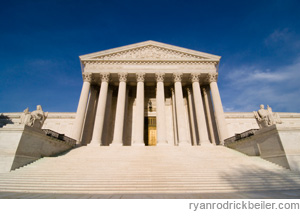 This week started off by honoring Martin Luther King Jr. and is ending with a Supreme Court decision, Citizens United, giving corporations unprecedented ability to affect election outcomes by declaring unconstitutional certain limitations on corporate expenditures on electioneering.
This week started off by honoring Martin Luther King Jr. and is ending with a Supreme Court decision, Citizens United, giving corporations unprecedented ability to affect election outcomes by declaring unconstitutional certain limitations on corporate expenditures on electioneering.
The connection between the two might not seem obvious. Campaign finance reform is seldom considered as a civil rights issue. These laws are not about discrimination based on characteristics like race, gender, or sexual orientation. In fact, limitations on corporate expenditures are not even about people, but are instead about state-created institutions -- corporations -- which can have perpetual life without conscience or soul. But at their core, campaign finance rules are about power imbalance. And power imbalance was something about which MLK was deeply concerned.
He talked about power imbalance in the speech he gave in support of striking sanitation workers the day before he was killed. He talked about power imbalance when condemning U.S. policy in Vietnam. And he talked about power imbalance when urging Congress members to expand and protect the voting rights of minorities. Two different themes are prevalent in MLK's discussions about power: (1) the responsibilities and obligations of those who have power, and (2) how those with little power can use what they have to stand up to those with more. He exhorted that people with little means need to refrain from spending their dollars on products produced by discriminatory employers. That Congress needs to give the ballot to the people so the people can shape the laws that govern them. That America needs to be a promoter of peace and justice in world affairs.
Appeals to moral obligations and the duties of citizenship rarely come up in discussions of campaign finance regulations of corporations, however, and it is no wonder. The emergence of MLK's themes about power flow from what MLK calls the "supreme unifying principle of life" -- love. But of course, being creations of law and society, and not people, MLK's unifying principle of life does not apply to corporations. Appeals to fairness or guilt or patriotism do not work on something without a conscience, and they seem unlikely to move corporate decision-making.
The only things that control or limit the behavior of corporations are laws. The Bipartisan Campaign Reform Act (BCRA) was such a limiting law; it prohibited corporations from expressly advocating the election or defeat of particular candidates or broadcasting election communications within the period before federal elections in which those advertisements would have the greatest impact on the election outcome. BCRA did not attempt to regulate how corporations made their money, nor did it deprive corporations of the opportunity to pursue dominance in the market. It did, however, seek to prevent a corporation's dominance in the market from turning into dominance in politics.
In Citizens United, in addition to gutting part of BCRA, the 63-year-old ban on corporate independent expenditures first set forth in the Taft-Hartley Act was also removed from the law. The Court's 5-4 decision eliminated any meaningful separation between the market and politics. It seized the role of protector of unfettered speech rights of those corporations Justice Kennedy called the "voices that best represent the most significant segments of the economy." The judicial branch's assertion of this role stands in stark contrast to the role played by the judicial branch which earned praise by MLK in 1957 for being the only government branch accepting any real responsibility for protecting the citizenship rights of the men and women who were marginalized and disenfranchised in this country.
Jim Wallis soberly observes in his new book Rediscovering Values: On Wall Street, Main Street, and Your Street-A Moral Compass for the New Economy that "[t]he market has trumped all else and replaced much of the moral space of society." The Supreme Court's decision Thursday cemented that triumph of the market over the "moral space" in our county.
 Myrna Pérez is Counsel in the Democracy Program at the Brennan Center for Justice at NYU School of Law.
Myrna Pérez is Counsel in the Democracy Program at the Brennan Center for Justice at NYU School of Law.
Got something to say about what you're reading? We value your feedback!